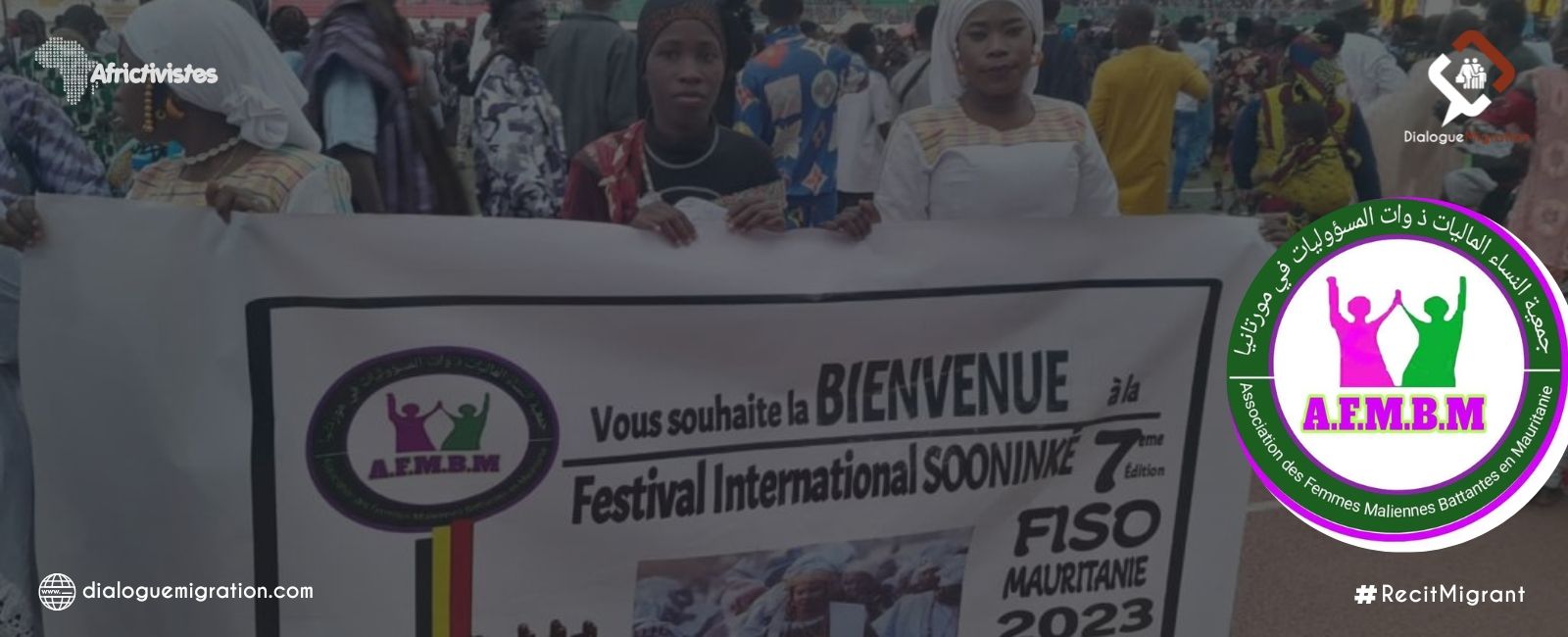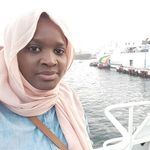

Dear listeners of dialogue migration, welcome!
Today we welcome Fatoumata Coulibaly. Born in 1970 in Nioro, Mali, she settled in Mauritania in 1988 with her husband. Currently divorced, she is the mother of 6 children. This fifty-year-old black woman lives in the commune of Sebkha in the suburbs of Nouakchott. Fatoumata is president of the Association of Malian Women in Mauritania. She is also the president of the Association des Femmes Battantes de Mauritanie.
Question 1: Hello Fatoumata! How did you come up with the idea of creating this association?
Through a forced marriage, I was a victim of violence when I was 16. Faced with this trauma that I have not forgotten; I created an association (editor’s note: association of Malian women in Mauritania). This creation was not a mere event because when settled in Mauritania, I noticed something. Many girls were victims of violence.
Question 2: The objective being to fight for the victims, is the association open to nationals of other African countries or do you only welcome Malian women?
The association is open to everyone.
Question 3: Which year did you create it? And how many members do you have to date?
The association was created on November 19, 2019 and has 25 members
Question 4: It is obvious that you have engaged with the local administrative authorities, do you have any comments on the procedure for obtaining the registration. Was it slow or easy for you? How did you go about it?
No alhamdulillah, the acquisition of my registration from the Ministry of Interior was not difficult. I previously worked with the registration document from the Embassy of Mali with the recognition of the commune of Sebkha, by the mayor of the commune. After three years, we got the final registration. By the way, we thank the Mauritanian State as well as it’s civil society because we have never suffered discrimination between foreigners and Mauritanians.
Question 5: When you say that there is no discrimination, can you tell us more about the actions of the authorities towards you?
There is a good number of training activities or workshops to which I am invited, helping me to build my capacity. These activities allow me to make my association visible. They also provide me with the opportunity to explain the difficulties faced by migrants on Mauritanian territory. Indeed, I am respected and listened to in this country.
Question 6: In general, what difficulties do migrants face in the country?
At the borders, migrants face enormous problems. Truth is, by crossing the border of a country, one becomes a migrant. So before crossing, you will need to know the laws and regulations of this country. For example, before coming to Mauritania, you must first know what is allowed and what is not.
Question 7: Do you mean that it is because they are not, for the most part, informed about their rights that they are illegal?
There are many migrants who arrive and who spend difficult times in police stations because they cannot defend themselves. They are within their rights but unfortunately they do not know it. All this is due to the lack of awareness.
Question 8: Are you able to raise awareness among these migrants?
Yes, I work with migrants because I am a community relay through the NGO AGD and IOM. In the same vein, the association I run raises awareness about these issues, whether on domestic violence or the exploitation of domestic workers.
Question 9: Regarding girl domestic workers, how do they come? On the onset, it looks like a whole organization in the countries of origin, if you look at the case of Mali. Are there any standards to be met in relation to the required age, the proposed salary or foster home?
Since 2012, Mali has been going through a difficult situation. Without their parents’ consent, girls go in search of a better life. Indeed, in Bamako, they are not well paid. They receive a salary of 10,000 FCFA per month. On the other hand, in Mauritania, they are well paid with salaries that are around 50,000 or 60,000 ouguiyas (editor’s note: 87,000 FCFA or 105,000 FCFA). Unfortunately, there are a lot of unkept promises. And there, begins a difficult life: by taking away their IDs and phones, they are sequestered and this situation is not unique to Malian house workers but to many migrants who carry out this type of work. On this, we appeal to the two authorities, the Malian State and that of Mauritania, so that these girls can get out of these networks.
Question 10: Are you familiar with these networks? Are you able to spot people who are doing this kind of trafficking?
Of course, yes!
Question 11: Did you challenge them?
I have a good relationship with my embassy. I called out the Ambassador, His Excellency Mamady and he called me back for a conversation on the issue. We are working together on these matters. I know of people who are in Bamako and Mauritania and who are in these trafficking networks (editor’s note: human trafficking). To eradicate this phenomenon, we must start at the source, which is in Mali.
Question 12: Now in terms of integration, how do you see the integration of Malians in relation to other migrants in Mauritania?
Before, migrants suffered a lot in Mauritania but today the situation is quite different, thanks to God.
Question 13: Do you have examples of what has changed?
The number of irregular migrants has decreased, the residence permit that prevented some people from going about their business is no longer a problem for some. We thank the IOM for giving all migrants a free residence permit in collaboration with the Mauritanian State. My children, some members of the association and I had our residence permit without difficulty. Nevertheless, there are many migrants who have already made the enrolment and who have received their receipts but cannot find their residence permits; they are tired.
Question 14: Why didn’t they get their residence permit?
I don’t know why.
Question 15: How do you feel about these victims of human trafficking? Can you tell us how you welcome them into your home?
I host migrants with great devotion. I’m sensitive, I cannot afford watching a person suffer, especially a fellow citizen. I don’t have the resources, I only took an apartment. The victims occupy the living room and the master bedroom as a dormitory. I am the one who funds everything.
Question 16: How many victims do you currently have staying with you?
This month, I received three victims, two Malian and a Chadian woman with her baby.
Question 17: What is the problem of the Chadian woman?
It is confidential, there are cases classified as confidential that I cannot disclose.
Question 18: Do you feel like a migrant here in Mauritania? Do you feel like you’re being sidelined?
No, I’ve been here for 30 years and I’ve worked for 25 years as a small trader at the market but I’ve never felt like a foreigner. I have never been worried about paper checks; I feel at home here in Mauritania.
Question 19: Fatoumata, we are coming to the end of our interview. The last question is: What perception do you have about mutual aid and solidarity in Africa, as a woman who often assists these victims of human trafficking?
We stand in solidarity with each other. If a woman has problems, we help her, and make contributions. We do tontines too. We cover one’s back. It’s not just Malians. During the month of Ramadan, when I receive from people bags of rice, sugar and others, I call on vulnerable families to give them these donations. In 2021, the NGO UN Challenge donated rice that we distributed. Last year, it was the same with our embassy. The latter had given us donations, and then we did the distribution. As women, we also contribute with sugar; each one of us brings what they can, then we share it with the needy families. We share what little we have with others. Thank God!
Question 20: Thank you Fatoumata
Thank you too
Dear listeners, Dialogue Migration was talking to Fatoumata Coulibaly who is president of the Association of Malian Women in Mauritania. She is also the president of the Association des Femmes Battantes de Mauritanie. It was a pleasure to host her.
As for me, I will see you very soon.


